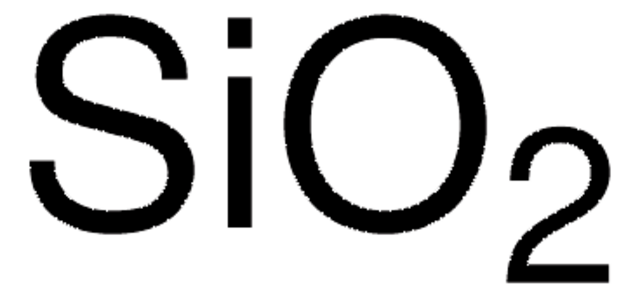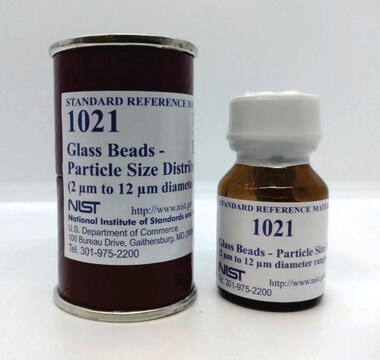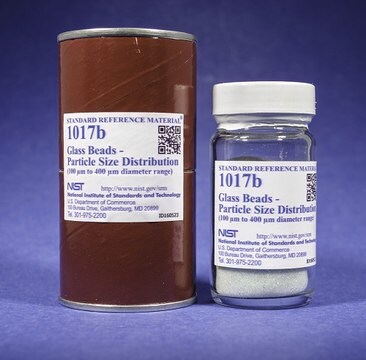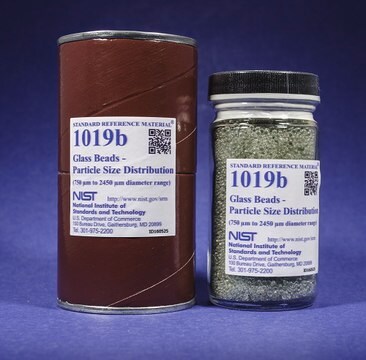44054
Micro particles based on silicon dioxide
size: 5 μm
Synonym(s):
Silica dioxide microsphere (5 μm), Micro silicon (5 μm), Beads based on silicon dioxide, microsize, Silicon dioxide beads
Sign Into View Organizational & Contract Pricing
All Photos(1)
About This Item
Recommended Products
grade
analytical standard
Quality Level
form
aqueous suspension
concentration
5% (solids)
particle size
5 μm std dev ≤0.35 μm
application(s)
glass & ceramic
industrial qc
pharmaceutical
format
neat
storage temp.
2-8°C
SMILES string
O=[Si]=O
InChI
1S/O2Si/c1-3-2
InChI key
VYPSYNLAJGMNEJ-UHFFFAOYSA-N
Looking for similar products? Visit Product Comparison Guide
General description
Silicon dioxide based microparticles are ideal to determine particle size distribution (PSD) profile of test samples.
The particle diameter of 5 μm is measured using Coulter Multisizer.
The particle diameter of 5 μm is measured using Coulter Multisizer.
Application
Used for regular calibration and checking of particle size instruments. Also used:
- to study transport properties of microscopic particles via heterogeneous media
- as a test standard to validate denoising method used in optical diffraction tomography
- in accelerated annealing experiments involving colloidal silica monolayers
- to evaluate the measurement accuracy of color-coded LED microscopy (cLEDscope) technique
- as a calibration standard in optical trapping system to measure surface mechanical properties
Features and Benefits
- suitable for routine instrument calibration monitoring, testing and corrections
- particle size traceable to Community Bureau of Reference (BCR) standards
- available in 5 mL pack size as a neat sample
Storage Class Code
10 - Combustible liquids
WGK
WGK 2
Flash Point(F)
Not applicable
Flash Point(C)
Not applicable
Personal Protective Equipment
dust mask type N95 (US), Eyeshields, Gloves
Choose from one of the most recent versions:
Already Own This Product?
Find documentation for the products that you have recently purchased in the Document Library.
Customers Also Viewed
Chansuk Park et al.
Journal of the Optical Society of America. A, Optics, image science, and vision, 35(11), 1891-1898 (2018-11-22)
Optical diffraction tomography (ODT) is a three-dimensional (3D) quantitative phase imaging technique, which enables the reconstruction of the 3D refractive index (RI) distribution of a transparent sample. Due to its fast, non-invasive, and quantitative imaging capability, ODT has emerged as
JooWon Lim et al.
Optics express, 23(13), 16933-16948 (2015-07-21)
In optical tomography, there exist certain spatial frequency components that cannot be measured due to the limited projection angles imposed by the numerical aperture of objective lenses. This limitation, often called as the missing cone problem, causes the under-estimation of
Sophie Ramananarivo et al.
Nature communications, 10(1), 3380-3380 (2019-07-31)
Molecular motors are essential to the living, generating fluctuations that boost transport and assist assembly. Active colloids, that consume energy to move, hold similar potential for man-made materials controlled by forces generated from within. Yet, their use as a powerhouse
Single-exposure quantitative phase imaging in color-coded LED microscopy
Lee W, et al.
Optics Express, 25(7), 8398-8411 (2017)
Cycle-consistent deep learning approach to coherent noise reduction in optical diffraction tomography
Choi G, et al.
Optics Express, 27(4), 4927-4943 (2019)
Our team of scientists has experience in all areas of research including Life Science, Material Science, Chemical Synthesis, Chromatography, Analytical and many others.
Contact Technical Service






